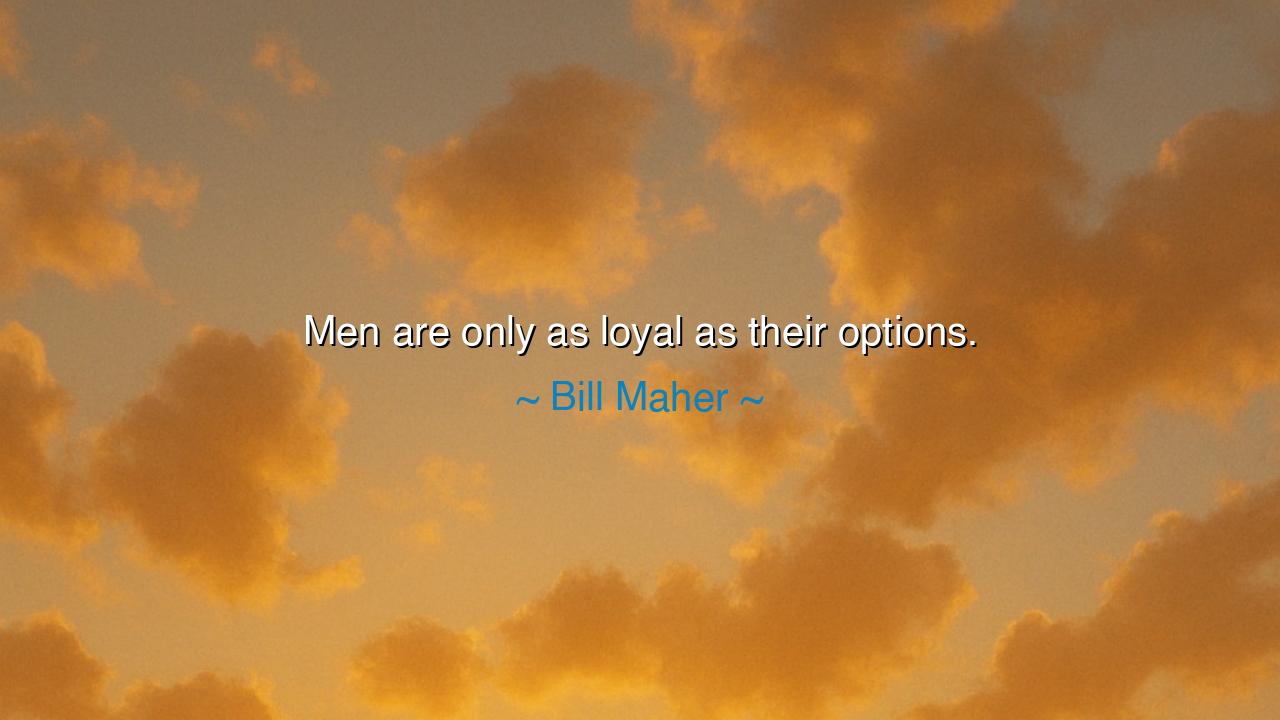
Men are only as loyal as their options.






In the grand sweep of human history, the question of loyalty has always been a central theme, one that shapes the bonds between individuals, families, and even nations. Bill Maher’s statement, "Men are only as loyal as their options," speaks to the fragility of human allegiance in the face of temptation and choice. Loyalty, according to Maher, is not an inherent virtue but a conditional one, dependent on the alternatives available to an individual. It suggests that when other opportunities present themselves, one’s loyalty may shift, revealing the deeper layers of human nature that are often overlooked. Maher’s words force us to confront a difficult truth: true loyalty is often a reflection of circumstance, rather than an unshakable principle.
In the ancient world, the concept of loyalty was revered, yet it was often tested by the choices that life presented. The Greeks understood loyalty as a virtue tied to the gods and to the oaths made between men. Homer’s Iliad, for instance, speaks of the loyalty between Achilles and his comrades, yet we see that loyalty is not absolute—it is tested by the choices made in moments of temptation or desperation. Achilles, the great hero, chooses to withdraw from the war, abandoning his comrades, when he feels his honor has been slighted. In this way, the ancient Greeks, like Maher, recognized that loyalty is a complex interplay of relationships, honor, and the choices available to an individual in the heat of the moment. The loyalty of Achilles was only as strong as the options that were before him, just as Maher suggests that a man’s loyalty is tied to what alternatives life offers.
Consider the Romans, whose loyalty was often to the state, but their personal allegiance could also be swayed by other forces. Julius Caesar, in his rise to power, manipulated the loyalty of his soldiers, offering them wealth and land in return for their loyalty. His army’s allegiance was not rooted in any noble principle, but in the rewards that Caesar could provide. This transactional nature of loyalty was, in many ways, a reflection of the human condition that Maher describes—men’s loyalty is often tied to what is offered to them. Caesar’s soldiers would remain loyal as long as they had no better options, but when Caesar’s power waned, their loyalty quickly faded.
In the medieval world, the concept of vassalage reveals similar dynamics. Feudal lords expected loyalty from their vassals in exchange for protection and land. However, when another more powerful lord offered greater rewards or more security, that loyalty could be easily transferred. The Viking sagas are filled with stories of warriors switching sides depending on the promises of future gain. Ragnar Lothbrok, a legendary Viking hero, is often depicted as a leader whose warriors remain loyal to him, but that loyalty is constantly tested by the promise of spoils or victory offered by other kings or warlords. Maher’s insight into loyalty as a function of available options rings true here as well—no matter how strong the allegiance, the potential for gain will often dictate where loyalty is directed.
Maher’s quote also reflects a more modern understanding of loyalty—one that plays out in the choices between work, love, and personal ambition. Take, for example, the story of the industrial revolution, where workers were expected to remain loyal to their employers, even in the face of grueling conditions. However, the rise of labor unions and the eventual creation of better working conditions provided workers with other options. The loyalty once demanded by factory owners began to shift as workers had the freedom to choose their paths, demanding better wages and rights. Here, loyalty was tested by the options available to workers—when other paths became visible, their allegiance to the factory system weakened.
The lesson of Maher’s statement is one of realism and self-awareness. It challenges the notion that loyalty is always a noble or unconditional trait, revealing instead that it is often a pragmatic choice, rooted in the circumstances surrounding an individual. This should not lead us to cynicism, but rather to a deeper understanding of human nature. Loyalty, like any other virtue, can be transitory, influenced by the situations we face and the options available to us. The true test of loyalty, then, is not whether we remain steadfast in the face of temptation, but whether we act with integrity when the options we face are numerous and varied.
In our own lives, we must remember that loyalty is not an absolute; it is shaped by our choices and the context in which we live. Just as Achilles, Caesar, and the medieval vassals made decisions based on the circumstances around them, so too must we reflect on the choices we make in relationships, careers, and loyalty to others. The key lesson here is to honor loyalty not as an unbending principle but as a dynamic force that is shaped by the options and opportunities that present themselves. By doing so, we may better understand the loyalties of others and be more mindful of the commitments we choose to make in our own lives. Loyalty, in the end, is not about unflinching devotion, but about the wisdom to make choices that align with our values and truths, even when other paths appear before us.






AAdministratorAdministrator
Welcome, honored guests. Please leave a comment, we will respond soon